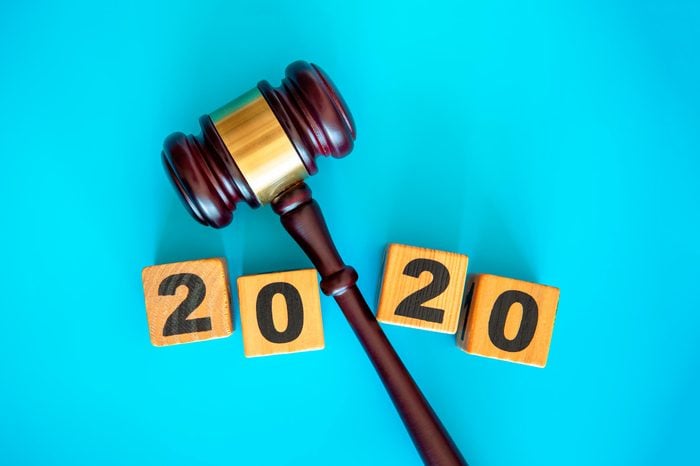
New year, new laws
The ringing in of the new year inevitably brings with it new laws. Here is our roundup of the most interesting of the new laws across the United States. But first, find out if you might be breaking one of these weird laws without even realizing it.

California frees the hairdo
As of January 1, 2020, California now forbids discrimination against individuals who choose to wear their hair in its “natural form.” This means it’s now illegal for California businesses and schools to enforce personal grooming codes that disproportionately affect people of color by prohibiting afros, twists, dreadlocks, braids, and cornrows. California was the first state to pass such a law in 2019; New York and New Jersey have since passed their own versions of what is called the Crown Act.
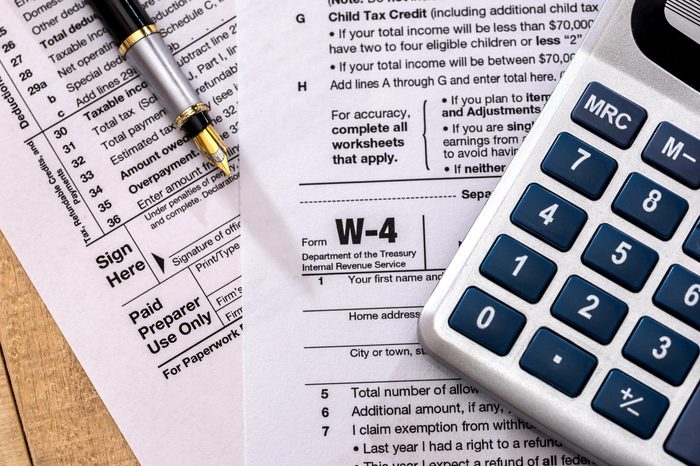
New hires will need to fill out a newly redesigned W-4
Regardless of what state you live in, as of January 1, 2020, you’ll be asked to fill out and sign a newly revised W-4 form when you onboard at a new job. Fortunately, the new form is intended to be more user-friendly than the old form. Reflecting changes to federal tax laws in 2017 that, among other things, eliminate personal and dependent exemptions, the new form does away with the part where you used to be able to fill in your withholding allowance. Instead, the form walks you through all deductions and adjustments that will now be taken into account in determining the amount to be withheld from each paycheck. Find out 22 other things tax experts wish you knew about the new tax law.
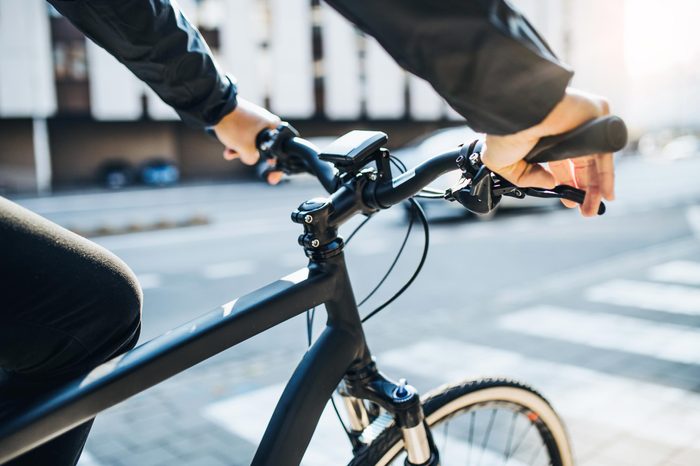
Oregon cyclists can now yield instead of stop
As of January 1, 2020, cyclists are now legally permitted to yield at a stop sign or blinking red lights—at a safe speed and as long as they have a clear right of way. Called an “Idaho Stop” in honor of its neighbor which has given cyclists this right since 1982, the new law is praised by its proponents as making things safer for those on two wheels. Studies have shown that cities in Idaho are about 30 percent safer for cyclists than cities outside the state. Delaware and Arkansas have passed similar laws.

Booster seats for longer in Washington
It used to be that once you turned eight in Washington state, you could wave bye-bye to your booster seat. Thanks to a new law that went into effect on January 1, 2020, kids as old as 12 could be required to stay in their booster seats if they’re not yet at least 4’9″ tall. Find out the dumbest laws in every state.
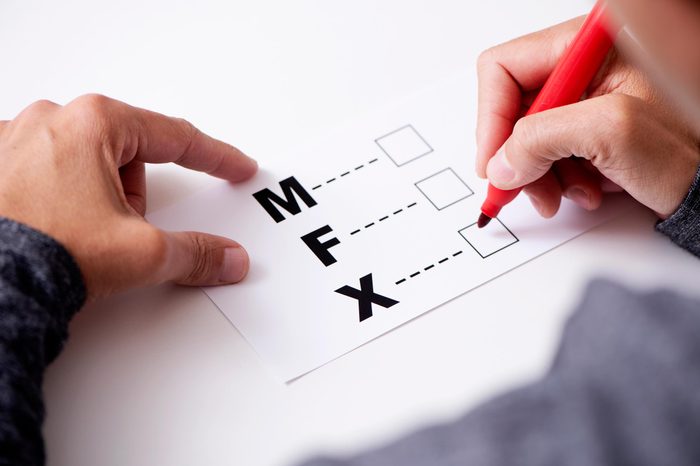
New Hampshire acknowledges non-binary gender identification
As of January 1, 2020, if you don’t see yourself as a male or a female, you can mark your sex as “X” for purposes of your New Hampshire driver’s license. New Hampshire joins 12 other states, as well as the District of Columbia, in acknowledging non-binary gender identification, including Arkansas, California, Colorado, Indiana, Maine, Maryland, Massachusetts, Minnesota, Nevada, Oregon, Utah, and Vermont. Hawaii and Pennsylvania are expected to fall into line sometime this year. Gender non-conforming was one of 25 new words added to the dictionary in 2019.

You might get paid overtime
Starting this year, you might be newly eligible to be paid overtime. That’s because the U.S. Department of Labor has raised the earnings threshold for overtime eligibility from $455 per week to $684 per week before taxes. Under the new rule, an estimated 1.3 million people will be newly eligible for overtime (or the equivalent in bonuses and commissions or other additional pay). That doesn’t mean you’ll automatically get paid more if you work a holiday, however.

7 million workers will get a minimum-wage raise
As of January 1, 2020, 21 states and 26 cities and counties began phasing in minimum wage increases, according to the National Employment Law Project. Later in 2020, four more states and 23 cities and counties will do likewise; by the end of 2020, 32 localities will have raised the minimum wage to at least $15 per hour. “Almost 7 million workers could benefit from the pay increases, with some earning as much as $1,700 more per year,” CBS reports.

Michigan has legalized recreational purchase, possession, and home-growing of marijuana
As of December 6, 2019, Michigan became the 10th state to legalize the recreational purchase (from licensed retailers), use (on private property and at licensed venues) and possession of marijuana—up to 10 ounces at home, and up to 2.5 ounces on their person, including when driving, although it is not legal to use marijuana while in a vehicle or to drive while under the influence of marijuana. Michigan residents can also grow up to 12 of their own cannabis plants (as long as they’re hidden from public view). Despite all of this, Michigan employers can still refuse to hire and can fire or discipline, employees who test positive for marijuana. Here are 13 of the strangest liquor laws in the United States.

Illinois legalizes recreational marijuana and pardons prior marijuana convictions
In Illinois, state residents can now purchase and possess up to 30 grams of cannabis, and up to five grams of cannabis concentrate and cannabis-infused products that contain up to 500 milligrams of THC (the psychoactive ingredient in marijuana). As in Michigan, only licensed retailers can sell recreational marijuana. Unlike in Michigan, home growing remains prohibited, but on the bright side, Illinois governor J.B. Pritzker has made it a priority to expunge all non-violent marijuana-use and possession crimes involving 30 grams or less.

Nevada employers can’t pass over a job candidate based solely on recreational marijuana use
Marijuana was legalized for recreational use in Nevada as of January 1, 2016 (allowing the purchase, cultivation, possession, and consumption of up to one ounce of marijuana, and the cultivation of up to six marijuana plants at a time), but employers could still refuse to hire candidates who tested positive for marijuana use. As of January 1, 2020, employers can no longer refuse to hire candidates solely on the basis of marijuana use. Nevada is the first state in the United States to pass such a law ( which won’t apply to firefighters, EMTs, employees who operate a motor vehicle, and anyone else for whom marijuana use could adversely affect safety).

No more cash bail in New York
The days of “wealth-based incarceration” are now over in New York, as the state becomes the latest to eliminate pretrial detention and the right to get out of it by paying cash bail in 90 percent of all arrests (those involving misdemeanors and non-violent felonies). The arrests that are still subject to court-set bail include sex crimes, domestic violence, witness tampering, and terrorism.

Oregon and New York ban all non-reusable plastic bags
Starting January 1, 2020, retail stores in Oregon are prohibited from providing single-use bags, although they are permitted to charge at least five cents for paper bags and reusable plastic and fabric bags, while restaurants may provide paper bags at no cost. On March 1, 2020, New Yorkers will be subject to a similar law, one that bans all taxable business from distributing single-use plastic bags. As in Oregon, when a customer does not bring a reusable bag of their own, the business may charge for paper bags. New York and Oregon join California, Connecticut, Delaware, Hawaii, Maine, Vermont, and several localities in other states in instituting a plastic bag ban or fee. Before you applaud the move, consider the cons of reusable bags most people don’t think about.

No more texting-while-driving in Florida and Massachusetts
As of January 1, Florida law enforcement officers began writing tickets for drivers texting while driving. If you’re speeding, the fines are higher. Massachusetts will begin writing texting-while-driving tickets starting February 23, but hands-free texting will still be permitted. While texting while driving has been illegal in the Bay State, the new law expands to cover any use of a handheld phone, including checking for directions and scrolling through your playlists. Besides texting, these are 13 things you may be doing in your car, but shouldn’t be.
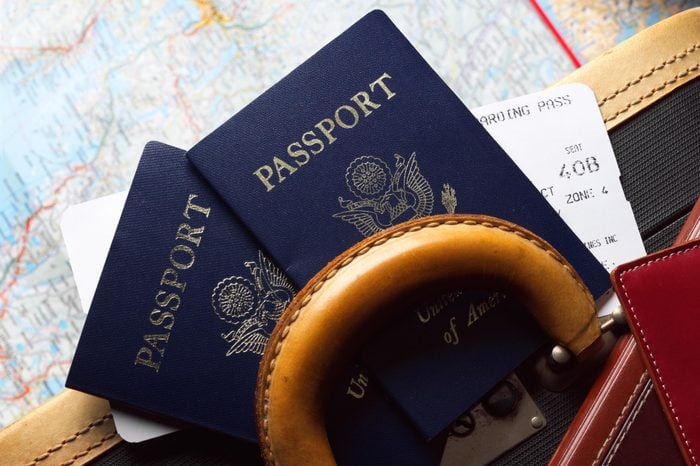
You won’t be able to board a plane without this
Starting October 1, 2020, adults 18 years and older won’t be permitted to board an airplane—even for a domestic flight—without presenting either a passport, a REAL ID-compliant driver’s license or identification, an “enhanced” driver’s license, or one of the other form of TSA-approved forms of identification. According to the Division of Motor Vehicles in White Plains, New York, there is a lot of confusion about this new TSA law, so we’d like to clear it up for you once and for all: if you don’t have a REAL ID or enhanced driver’s license, you can still travel with your passport or one of the other forms of TSA-approved identification. These travel tips are safe to ignore, though.
